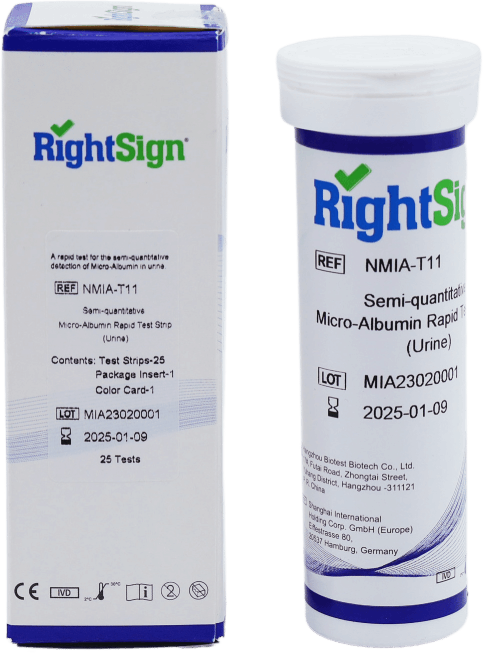Microalbumin Rapid Test
Our microalbumin rapid tests at OdemShop offer early detection of kidney damage, especially in diabetics. A simple way to monitor your health.
Microalbumin Urine Test
The microalbumin urine test is a critical diagnostic tool frequently utilized in the monitoring of renal function, particularly in individuals with conditions that predispose them to kidney damage, such as diabetes or hypertension. This assay measures the minute levels of albumin a type of protein that are excreted in the urine, an early indicator of potential kidney impairment.
Why the Microalbumin Test Matters
The microalbumin test is a critical diagnostic tool used to detect early signs of kidney damage, particularly in individuals with conditions such as diabetes or hypertension. By measuring the small amounts of albumin in urine, it provides valuable information on kidney function and helps in assessing the risk of developing renal complications.
Role of Albumin in Urine
Detecting albumin in urine through the test is a crucial indicator of kidney health. It often signifies the early stages of kidney damage before other symptoms become apparent.
Small amounts of albumin in the patient's urine may be an initial indicator of a kidney dysfunction.
Reasons for the test
The microalbumin test holds significant importance for individuals with diabetes or high blood pressure, as they are at a greater risk of developing kidney-related complications.
Monitoring Albumin Levels as a sign of Kidney Disease
Monitoring albumin levels through a test is crucial for the early detection of kidney disease. Increased albumin excretion can be one of the first signs of renal impairment.
An abnormal albumin-to-creatinine ratio indicates albumin in the urine, signaling a risk for kidney damage.
Microalbuminuria Among People with Diabetes
Individuals with diabetes are regularly subjected to microalbumin tests to identify early signs of kidney damage, a common complication of this condition.
Reasons for Microalbuminuria Testing in Diabetes:
To Monitor Kidney Health: Measure the amount of albumin, indicating kidney function.
Identifying Risk: A high level of albumin points to potential diabetes and kidney disease.
The ratio urine test helps in assessing the presence of urine microalbumin.

Microalbumin Urine Tests for High Blood Pressure Patients
Similarly to those with diabetes, patients with high blood pressure may undergo microalbumin urine tests to detect early kidney damage related to hypertension.
Understanding Albumin and Creatinine Ratio
Understanding the Albumin-to-Creatinine Ratio (ACR)
The Albumin-to-Creatinine Ratio (ACR) is an essential diagnostic tool for detecting the early signs of kidney disease. It measures the levels of protein in the urine, specifically albumin, which can indicate kidney damage when found in high amounts.
Rationale for ACR:
Detection: It's a reliable indicator for purchase managers and healthcare professionals to identify abnormal albumin levels in urine, suggesting possible kidney impairment.
Assessment: By comparing albumin levels with creatinine, a waste product consistently excreted at a steady rate, ACR provides a precise ratio that's critical for accurate diagnostics in clinical settings such as doctors' offices, elderly homes, and pharmacies.
Incorporating ACR testing into regular health screenings can significantly benefit patient care by offering early intervention opportunities.
Where Can I buy Microalbumin Test Kits in Wholesale?
Healthcare providers and organizations looking to purchase microalbumin test kits in bulk can find a reliable source at our Shop, Odemshop. We offer competitive pricing and quality assurance. These kits are essential for the first test in assessing albumin levels, which may indicate kidney issues.
How can a patient prepare for a Microalbumin Urine Test
Preparing for a microalbumin urine test typically involves simple, yet specific steps to ensure accurate results.
Patients are usually instructed to collect either a random urine sample or a 24-hour urine sample, with the latter requiring all urine to be collected over a full day.
It is critical that patients follow the provided guidelines meticulously to avoid compromising the test's validity.
Steps on How to Provide a Urine Sample
Prior to undergoing a Microalbumin Urine Test, patients should consult with their healthcare provider to determine any specific preparations required.
To prepare for the test:
The patient must Collect the Urine:
- For a 24-hour urine sample, collect all urine at home in a provided container.
- For a single sample, collect this urine in a sterile cup.
Understanding how to provide a urine sample is crucial for accurate results.
Why It's Essential to Collect All The Urine
Ensuring the complete collection of urine over the specified period is vital for the accuracy of the Test. This is because it allows for an exact measurement of albumin excretion.
When the test is performed, usually as a 24-hour urine sample, it's important to collect all of your urine. This is done to assess how much albumin is leaking into the urine. The collected urine is then compared against creatinine levels to determine normal results.

What Do Test Results Mean in the Microalbumin Urine Test?
Understanding the implications of test results is pivotal for monitoring kidney health.
Normal albumin levels are indicative of optimal kidney function, whereas abnormal results could signal the onset of kidney impairment, warranting further clinical scrutiny.
It is essential that patients are promptly briefed on the necessary subsequent actions following their test results. These actions may encompass a spectrum of additional diagnostics or therapeutic strategies to address potential kidney issues effectively.
As purchase managers, medical practitioners, elderly home administrators, and pharmacists, recognizing the significance of these results ensures the delivery of top-tier healthcare and management of renal health.
Interpreting Normal Albumin Levels in Test Results
A microalbumin test yielding results within normal range suggests that the kidneys are functioning properly and there is no significant albumin leakage into the urine.
Normal Albumin Levels:
- Indicate kidneys are filtering as expected
- Minimal concern for kidney damage
Next Steps:
- No immediate action needed
- Periodic monitoring may be advised
Normal results may mean no repeat of the test is necessary unless other symptoms arise.
Understanding Abnormal Results in Microalbuminuria Test
Abnormal results from a microalbumin urine test may indicate early signs of kidney damage, particularly in the context of diseases such as diabetes or hypertension. Elevated levels of urine microalbumin, detected in the microalbuminuria test, suggest that the kidneys are not functioning properly.
Persistent abnormal results could mean that an individual is at risk of being diagnosed with kidney disease, a leading cause of kidney failure.
Changes in albumin
Now that we have examined the normal values for albumin, let's look at what changes in albumin may occur.
| Effect | Risk |
|---|---|
|
|
Next Steps for The Patient After Getting Test Results
Upon obtaining abnormal microalbumin urine test results, it is crucial for patients to engage in a consultation with their healthcare provider. This conversation aims to illuminate the significance of the findings and formulate a tailored management plan.
Next Steps for the Patient: - Delve into the health encyclopedia to deepen your understanding of kidney function. - Explore the National Kidney Foundation for a wealth of supportive resources.
Factors Affecting Results: - Grasp the prevalent causes of kidney disease. - Pinpoint any medications or conditions that may influence your test outcomes.
For Purchase Managers, Doctors, Elderly Homes, and Pharmacies, staying informed on these protocols ensures the highest standard of patient care and health management.
Here are more cardiovascular tests:

